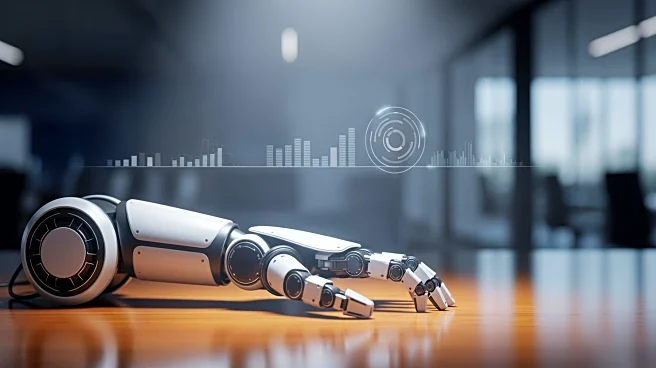What's Happening?
Over 700 high-profile individuals have signed a statement advocating for the prohibition of AI superintelligence development until it can be conducted safely and with public approval. The statement, released
on Thursday, highlights concerns about AI models that could surpass human cognitive abilities without adequate oversight. Signatories include AI pioneers Yoshua Bengio and Geoffrey Hinton, as well as celebrities like Kate Bush and Joseph Gordon-Levitt. The statement reflects fears regarding potential threats to freedom, national security, and even human survival. Elon Musk, who has previously warned about AI risks, signed a similar letter earlier this year. A poll by the Future of Life Institute indicates that only 5% of Americans support the current rapid development of superintelligent AI, with 64% advocating for safety and control measures before further development.
Why It's Important?
The call for a prohibition on AI superintelligence development underscores significant concerns about the unchecked advancement of AI technologies. The potential for AI to outperform humans in cognitive tasks raises ethical and security questions, impacting industries reliant on AI, such as technology and defense. The demand for robust regulation reflects a growing public unease about AI's role in society and its potential to disrupt existing systems. Stakeholders in technology and policy must navigate these concerns to balance innovation with safety, as the implications of AI advancements could reshape economic and social landscapes.
What's Next?
The statement invites further signatures, with the current count at 27,700, indicating widespread support for cautious AI development. As public discourse intensifies, policymakers may face pressure to implement regulations governing AI technologies. Tech companies could be compelled to adjust their strategies to align with safety standards, potentially slowing the pace of AI innovation. The ongoing debate may lead to legislative actions aimed at ensuring AI development prioritizes human safety and ethical considerations.
Beyond the Headlines
The prohibition call highlights deeper ethical dilemmas surrounding AI, such as the balance between technological progress and human oversight. The development of superintelligent AI poses questions about the future of work, privacy, and autonomy, challenging existing legal frameworks. Long-term, this debate could influence cultural perceptions of technology and its role in society, prompting shifts in how AI is integrated into daily life.









